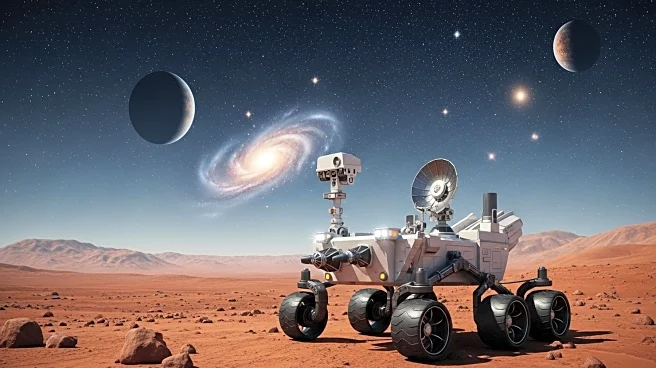What's Happening?
NASA's Perseverance rover has made a significant discovery on Mars, uncovering a rock rich in organic materials that could suggest past life. The rock, found in the Jezero Crater, contains minerals such as vivianite and greigite, which on Earth are typically formed through life-related chemical reactions. This finding is part of a broader wave of space exploration activities, including SpaceX's record-setting launches and the European Space Agency's new lunar lander project. The Perseverance rover's discovery is particularly intriguing as it hints at the possibility of ancient microbial life on Mars, although researchers caution that this is indirect evidence and not definitive proof.
Why It's Important?
The discovery by NASA's Perseverance rover is crucial as it adds to the growing body of evidence that Mars may have once harbored life. This finding could have profound implications for our understanding of life's potential beyond Earth, influencing future Mars exploration missions and the search for extraterrestrial life. The broader context of space exploration, including advancements by SpaceX and international collaborations, highlights the increasing pace and ambition of space activities. These developments could lead to significant scientific breakthroughs and technological advancements, impacting industries such as telecommunications, defense, and international cooperation in space.
What's Next?
NASA plans to continue its exploration of Mars with the Perseverance rover, which will collect and cache samples for potential return to Earth. These samples could provide more conclusive evidence of past life on Mars. Meanwhile, SpaceX is preparing for the next test flight of its Starship rocket, aiming to achieve a fully reusable launch system. The European Space Agency is also advancing its lunar exploration efforts, which could lead to new partnerships and missions. These activities suggest a future where space exploration becomes more collaborative and commercially driven, with potential benefits for scientific research and economic growth.
Beyond the Headlines
The discovery on Mars raises ethical and scientific questions about planetary protection and the potential contamination of extraterrestrial environments. As space exploration intensifies, there is a growing need for international regulations to ensure responsible exploration and prevent biological contamination. Additionally, the increasing involvement of private companies in space activities highlights the need for clear policies on space resource utilization and the sharing of scientific data. These issues will likely shape the future of space exploration and international cooperation in the coming decades.









